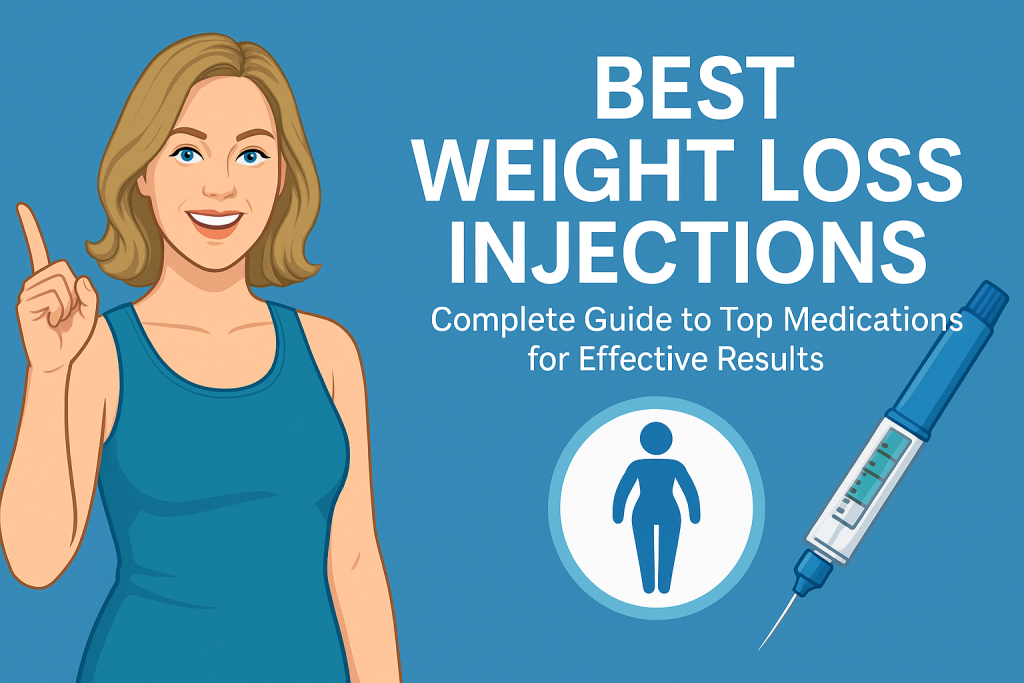The Rise of Weight Loss Injections
In recent years, the search for effective, science-backed methods for weight loss has led to the emergence of several innovative solutions. Among the most significant breakthroughs are weight loss injections, which have become increasingly popular for individuals struggling to shed excess pounds through diet and exercise alone. With celebrity endorsements and growing clinical evidence, injectable medications are reshaping the landscape of medical weight management, offering hope for people who have faced persistent challenges in achieving and maintaining a healthy weight.

This comprehensive guide explores the best weight loss injections available in 2025, breaking down how they work, their benefits, risks, and who they are suitable for. Whether you are considering these treatments or just want to stay informed about the latest weight loss strategies, this article provides the in-depth information you need to make empowered decisions about your health.
Understanding Weight Loss Injections: What Are They?
Weight loss injections are prescription medications administered via subcutaneous (under-the-skin) injection, designed to aid clinically significant weight loss. Unlike oral medications or over-the-counter supplements, these injections work through proven biological mechanisms, often mimicking hormones in your body that regulate appetite, metabolism, and insulin response.
The most common types of weight loss injections include GLP-1 receptor agonists (such as semaglutide and liraglutide), lipotropic injections (like MIC shots), and, in some cases, specialized hormone-based therapies. Medical professionals typically prescribe these medications for individuals who have a body mass index (BMI) of 30 or higher, or 27 or higher with related health conditions such as type 2 diabetes or hypertension.
Why Consider Injectable Medications for Weight Loss?
Injectable weight loss medications offer several advantages over traditional diet and exercise interventions alone. While lifestyle changes remain foundational, certain medical conditions, genetic predispositions, or metabolic adaptations can make it exceptionally difficult for some people to lose weight and keep it off. For these individuals, doctor-prescribed injections might be the missing piece in their weight management plan.
- Enhanced Satiety: Many injections help you feel full for longer, reducing calorie intake naturally.
- Improved Blood Sugar Control: Some also regulate glucose, benefiting those with or at risk of diabetes.
- Scientifically Proven: Most weight loss injections are backed by large, peer-reviewed clinical trials demonstrating real-world effectiveness.
- Medical Supervision: These medications are administered under professional care, increasing safety and monitoring for side effects.
It’s essential to note, however, that injections are not a magic bullet. They work best as part of a comprehensive program, including dietary changes, physical activity, and ongoing medical support.
Top 5 Weight Loss Injections of 2025
With new medications continuously emerging, it can be challenging to determine which weight loss injections are most effective. Based on current research, clinical approvals, and patient outcomes, the following five injectable medications stand out in 2025:
- Semaglutide (Wegovy, Ozempic)
- Liraglutide (Saxenda)
- Tirzepatide (Mounjaro)
- Lipotropics (MIC/B12 Injections)
- B12 Injections
In the sections below, we’ll explore each of these injections, how they work, their benefits and risks, and how to know if you’re a good candidate.
1. Semaglutide (Wegovy, Ozempic): The Proven Leader in Weight Loss Injections
What is Semaglutide?
Semaglutide is a GLP-1 receptor agonist originally developed to treat type 2 diabetes and later found to have remarkable effects on weight loss. It is marketed under brand names such as Wegovy (for weight loss) and Ozempic (primarily for diabetes, sometimes prescribed off-label for weight management).
How Semaglutide Works
Semaglutide mimics the action of glucagon-like peptide-1 (GLP-1), a natural hormone that plays a key role in regulating appetite and insulin release. By activating GLP-1 receptors, semaglutide slows gastric emptying (the rate at which food leaves your stomach), increases feelings of fullness, and reduces appetite. This leads to a significant reduction in calorie intake and, consequently, weight loss.
Clinical Results and Effectiveness
Semaglutide has been hailed as a game-changer due to its impressive clinical results. In the STEP trials, patients receiving 2.4 mg semaglutide weekly lost an average of 15-20% of their body weight over 68 weeks—substantially higher than many other therapies. These results have been observed across diverse patient groups, with both diabetic and non-diabetic participants experiencing substantial weight loss.
Semaglutide Benefits
- Significant, sustainable weight loss
- Reduced appetite and cravings
- Lowered risk markers for diabetes and cardiovascular disease
- Improved insulin sensitivity and glucose control
- Once-weekly dosing for convenience
Potential Side Effects and Risks
As with any potent medication, semaglutide can cause side effects. The most common are gastrointestinal, including nausea, vomiting, diarrhea, and constipation, particularly when starting therapy or increasing the dose. Most patients find these side effects diminish over time. Rare but serious risks include pancreatitis, gallbladder issues, and in rodent studies, thyroid C-cell tumors (though not observed in humans so far). It is critical to discuss your medical history with your healthcare provider before starting.
Who Should Consider Semaglutide?
Semaglutide is typically recommended for patients with a BMI ≥30, or ≥27 with weight-related medical problems. It is suitable for those who have struggled to lose weight through lifestyle changes alone and are willing to commit to regular injections and medical follow-up. It may not be appropriate for individuals with a history of medullary thyroid cancer, multiple endocrine neoplasia syndrome type 2, or certain digestive disorders.
2. Liraglutide (Saxenda): Daily Injections for Appetite Control
What is Liraglutide?
Liraglutide is another GLP-1 receptor agonist, sold under the brand name Saxenda for weight management and Victoza for diabetes. While it works similarly to semaglutide, liraglutide is administered as a daily injection rather than weekly.
How Liraglutide Works
Like semaglutide, liraglutide enhances the body’s natural GLP-1 activity, reducing appetite, slowing stomach emptying, and making you feel fuller after eating. This leads to steady, controlled weight loss, especially when combined with healthy eating habits and regular exercise.
Clinical Results and Effectiveness
Large-scale trials show liraglutide 3.0 mg daily results in average weight loss of 5-10% of body weight over 56 weeks. These results are meaningful and can significantly improve health outcomes in those with obesity-related risk factors.
Liraglutide Benefits
- Effective appetite suppression
- Daily dosing may provide a routine for some users
- Improved metabolic health markers
- Lowered risk of type 2 diabetes in prediabetic patients
Potential Side Effects and Risks
Side effects are similar to other GLP-1 agonists, with nausea, vomiting, and diarrhea being the most common. Pancreatitis, gallstones, and rare allergic reactions can also occur. Liraglutide is contraindicated in patients with a personal or family history of certain thyroid cancers.
Who Should Consider Liraglutide?
Liraglutide is suitable for individuals who prefer daily injections and whose insurance or prescription coverage may favor this option. It is widely available and may be preferred for those who cannot tolerate or access semaglutide.
3. Tirzepatide (Mounjaro): The Next Generation Dual-Action Injection
What is Tirzepatide?
Tirzepatide, marketed as Mounjaro, is a novel injectable medication approved for type 2 diabetes and under review for obesity treatment. It acts on both GLP-1 and GIP (glucose-dependent insulinotropic polypeptide) receptors, providing a dual mechanism for controlling appetite and blood sugar.
How Tirzepatide Works
Tirzepatide’s dual action increases feelings of fullness, reduces food intake, and enhances insulin secretion. By targeting two key metabolic pathways, tirzepatide may offer even greater weight loss than single-action GLP-1 medications.
Clinical Results and Effectiveness
In the SURMOUNT-1 trial, patients treated with tirzepatide lost an average of 15-22.5% of their body weight over 72 weeks—the most dramatic results recorded for any weight loss injection so far. The medication is being fast-tracked for obesity approval due to these outstanding outcomes.
Tirzepatide Benefits
- Exceptional weight loss outcomes
- Dual action (GLP-1 and GIP) may reduce side effects for some patients
- Once-weekly administration
- Significant metabolic improvements
Potential Side Effects and Risks
Gastrointestinal symptoms remain most common, especially during dose escalation. Some patients report fatigue, decreased appetite, or constipation. Long-term safety is being actively monitored in large post-approval studies.
Who Should Consider Tirzepatide?
Tirzepatide is currently indicated for type 2 diabetics, but its approval for obesity is expected soon. It may become the new gold standard for those requiring substantial weight loss who have not responded to other therapies.
4. Lipotropic Injections (MIC/B12): Boosting Metabolism and Fat Loss
What Are Lipotropic Injections?
Lipotropic injections typically combine methionine, inositol, and choline (MIC) with vitamin B12 and sometimes other nutrients. Unlike GLP-1 medications, these injections do not directly suppress appetite or dramatically impact weight, but may enhance fat metabolism and support healthy energy levels.
How Lipotropic Injections Work
MIC/B12 injections are believed to enhance the liver’s ability to process fat, convert nutrients to energy, and prevent fat accumulation. Their main benefit is as an adjunct to a reduced-calorie diet and active lifestyle, especially for those with vitamin B deficiencies or sluggish metabolism.
Clinical Results and Effectiveness
Evidence for lipotropic injections is largely anecdotal, with no large randomized controlled trials proving significant weight loss compared to placebo. However, many clinics offer these shots as part of medically supervised programs, with some patients reporting improved energy and incremental fat loss.
Lipotropic Injection Benefits
- May enhance fat metabolism
- Supports liver health and detoxification
- Can improve energy levels in those with deficiencies
- Generally well-tolerated with minimal side effects
Potential Side Effects and Risks
Most side effects are mild, such as injection site discomfort or rare allergic reactions. As with any supplement, quality and dosage should be managed by a reputable medical provider.
Who Should Consider Lipotropic Injections?
Lipotropic injections are best suited for individuals seeking metabolic support within a comprehensive weight loss program, rather than as a primary tool for significant weight reduction.
5. Vitamin B12 Injections: Supporting Energy and Metabolism
What Are B12 Injections?
Vitamin B12 injections deliver a concentrated dose of this essential vitamin, which is crucial for red blood cell production, neurological function, and energy metabolism. B12 deficiencies can lead to fatigue and metabolic slowdowns, making these shots popular in weight loss clinics.
Do B12 Injections Promote Weight Loss?
B12 shots are not directly responsible for weight loss, but they can help correct deficiencies that sabotage energy levels, exercise performance, and metabolism. They are an adjunct to comprehensive programs, not a standalone solution.
B12 Injection Benefits
- Corrects vitamin B12 deficiency
- Improves energy and stamina
- Supports healthy nervous system and metabolism
- Low risk of side effects
Potential Side Effects and Risks
B12 injections are considered very safe, with rare side effects such as mild pain or redness at the injection site. Allergic reactions are extremely uncommon.
Who Should Consider B12 Injections?
Individuals diagnosed with B12 deficiency—especially those with absorption issues, vegetarians, older adults, or those taking certain medications—may benefit from B12 injections as part of their overall weight loss and health plan.
Comparing the Top Weight Loss Injections: Which Is Best for You?
Choosing the best injection for weight loss depends on your medical history, weight loss goals, lifestyle preferences, and budget. Here’s a side-by-side comparison of the most popular options:
- Semaglutide (Wegovy, Ozempic): Best for substantial, clinically proven weight loss with once-weekly dosing; higher cost, very effective.
- Liraglutide (Saxenda): Great for those who prefer daily injections; slightly less effective but widely available.
- Tirzepatide (Mounjaro): Leading for maximum weight loss, especially for those with both diabetes and obesity; new and likely to be more widely available soon.
- Lipotropics (MIC/B12): Ideal for metabolic support or mild weight loss, but not as potent as GLP-1 options.
- B12 Injections: Beneficial for correcting deficiencies and boosting energy; not a primary weight loss tool.
Consultation with a qualified healthcare professional is essential for determining which medication aligns with your needs and to ensure safe, effective treatment.
Risks, Side Effects, and Safety Considerations
Common Side Effects Across Injections
All medications, including weight loss injections, carry potential side effects. Most commonly, users experience mild to moderate gastrointestinal symptoms such as nausea, vomiting, and diarrhea—especially in the first few weeks. These effects often subside as the body adjusts. Rare but serious complications (such as pancreatitis, gallbladder issues, or allergic reactions) require immediate medical attention.
Who Should Not Use Weight Loss Injections?
Not everyone is a candidate for injectable weight loss medications. Contraindications may include:
- Personal or family history of certain thyroid cancers
- History of pancreatitis or gallbladder disease
- Pregnancy or breastfeeding
- Allergy or hypersensitivity to components
- Active eating disorders
Always undergo a full medical evaluation before starting any injectable treatment.
Long-Term Safety and Monitoring
Most weight loss injections require ongoing medical supervision. Regular check-ups, blood tests, and health monitoring are essential to track progress and catch any emerging issues early. Your provider will also help you taper or switch medications if side effects become troublesome or if you achieve your weight loss goals and wish to stop therapy.
How to Get Weight Loss Injections: Steps and Tips
Step 1: Medical Evaluation
A comprehensive health assessment is the first step. Your doctor will review your medical history, current medications, weight loss history, and lab work to determine the most appropriate option.
Step 2: Prescription and Training
If eligible, your provider will prescribe the appropriate medication, train you on self-injection techniques or arrange for injections in-office, and establish a titration schedule to minimize side effects.
Step 3: Ongoing Support and Monitoring
Success with weight loss injections depends on regular follow-up, dietary counseling, and lifestyle modifications. Many clinics offer multidisciplinary programs for optimal outcomes.
Lifestyle Changes: Essential for Lasting Weight Loss Success
While injections can dramatically improve weight loss results, they are most effective when combined with sustainable lifestyle changes. Developing healthy habits not only enhances the effectiveness of medication but also ensures weight maintenance after stopping therapy.
Key Lifestyle Habits for Lasting Results
- Balanced Nutrition: Focus on whole foods, lean proteins, healthy fats, and fiber-rich vegetables.
- Regular Physical Activity: Aim for at least 150-300 minutes of moderate-intensity exercise per week.
- Stress Management: Use mindfulness, yoga, or counseling to reduce stress, which can trigger overeating.
- Quality Sleep: Aim for 7-9 hours per night to support metabolic health.
- Consistent Habits: Routine is key; avoid extreme or unsustainable changes.
Many clinics offer behavioral therapy, nutrition coaching, and physical activity plans alongside medication, maximizing safety and results.
Frequently Asked Questions About Weight Loss Injections
Are weight loss injections safe?
When prescribed and monitored by qualified healthcare providers, weight loss injections are generally safe for eligible individuals. Side effects are typically mild and manageable. However, no injectable therapy is risk-free, and close monitoring is a must.
How much weight can I lose with injections?
Results vary based on the medication, dosage, and adherence to lifestyle changes. Clinical studies show average losses of 5-22% of initial body weight, with the most profound results seen in GLP-1 and dual agonist medications.
How long do I need to take weight loss injections?
Most people use injections for months to years. Some may continue long-term, especially if they have chronic conditions like diabetes or significant obesity. Discontinuing medication may lead to some weight regain, so ongoing lifestyle changes are crucial.
Are weight loss injections covered by insurance?
Coverage varies by country, insurer, and medication. Semaglutide, liraglutide, and tirzepatide may be covered for certain diagnoses. Check with your insurance provider and discuss costs with your healthcare team.
Can I take weight loss injections with other medications?
Some drug interactions exist, especially with diabetes medications or drugs affecting gastrointestinal motility. Share your complete medication list with your provider.
Expert Tips for Maximizing Weight Loss Injection Results
- Follow Up Regularly: Routine blood work and check-ins help prevent and manage side effects.
- Start Low, Go Slow: Gradual dose titration reduces GI symptoms and improves long-term adherence.
- Track Progress: Use a journal or app to monitor weight, side effects, mood, and activity.
- Build a Support Network: Engage friends, family, or support groups for motivation and accountability.
- Plan for Plateaus: Weight loss is not always linear. Adjust lifestyle habits and consult your provider if progress stalls.
Future Trends: New Developments in Weight Loss Injections
The field of medical weight management is advancing rapidly. In addition to next-generation GLP-1 and GIP agonists, researchers are developing medications targeting other hormonal and metabolic pathways. Personalized medicine, genetic testing, and digital health platforms are expected to enhance treatment matching and long-term support.
As new data emerge, safety, effectiveness, and accessibility will remain priorities. Stay informed by following updates from reputable sources like the FDA, CDC, or major obesity research organizations.
Conclusion: Are Weight Loss Injections Right for You?
Weight loss injections represent a powerful tool for individuals struggling with obesity and weight-related health issues. With medications like semaglutide, liraglutide, and tirzepatide, many patients are achieving life-changing results previously thought unattainable with diet and exercise alone. However, these treatments are most effective when integrated into a holistic approach that prioritizes nutrition, activity, behavior, and regular medical care.
If you are considering injectable medications for weight loss, consult a board-certified healthcare provider to discuss your options, understand potential risks, and craft a comprehensive weight management plan tailored to your individual needs. With the right support, the journey toward a healthier, happier you is more achievable than ever.

